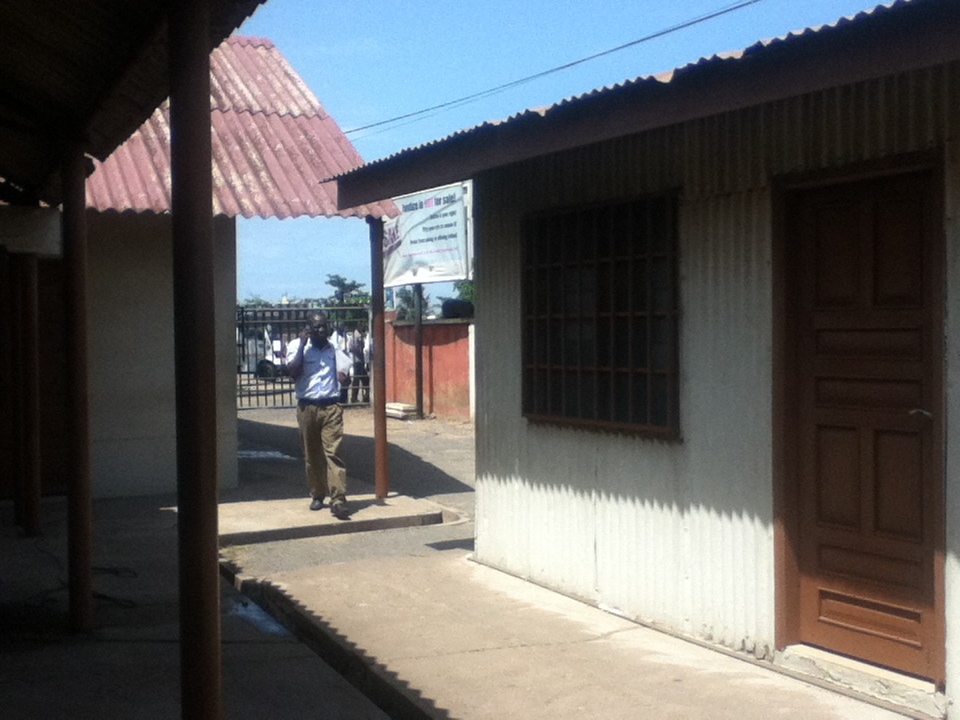By: Jim Ransdell
Jim Ransdell, 2L, interned at Legal Resources Centre in Accra, Ghana during the Summer of 2014 as part of Washington University School of Law’s Global Public Interest Law Internships. This is the second in a series of posts by Jim where he shares his experiences and observations working in a foreign legal system. Read his first post on legal education in Ghana, and his third on Criminal Sentencing in Ghana.
Courtroom Procedure & Decorum
Shadowing lawyers affiliated with Ghana’s constitutionally-mandated Legal Aid Scheme, I was able to observe court at the High Court complex in Accra. The High Court is the lowest of Ghana’s “Superior Courts.” It has appellate jurisdiction over District and Juvenile Courts, as well as criminal cases tried in Circuit Courts (civil cases are appealed to the Courts of Appeal). The High Court also has original jurisdiction in all matters, and authority to enforce Ghana’s constitutionally-guaranteed Fundamental Human Rights and Freedoms. Above both the High Courts and Courts of Appeals sits Ghana’s Supreme Court. All justices of the Superior & Supreme Courts are appointed. The structure of Ghana’s court system, though in many ways reminiscent of British colonial structures, has undergone far-reaching changes since independence. The current system was put in place by Ghana’s 1992 Constitution.
Non-domestic High Court proceedings are open for public observation. Trial sessions varied in length, from ten minutes to around two hours. At times, proceedings were tough to follow due to language barriers and the fact that lawyers addressed the judge with their backs to the audience.
Still, parties’ body language and non-verbal communication revealed a litany of little differences in courtroom decorum and procedure, although proceedings broadly resembled those of American courts. I have no experience with British courts, but I imagine that certain procedural tendencies were adapted from the British system.
Ghana has a constitutionally sanctioned dual legal system, with “formal” and “informal” (administered by traditional leaders) justice systems operating in unison, with certain disputes reserved for formal adjudication. The following observations relate only to the formal justice system:
- Due to the multitude of local languages in Ghana (nine officially recognized, and dozens more dialects), parties to judicial proceedings are guaranteed access to translators.
- Attorneys and witnesses address the judge directly, and judges in lower courts take hand-written notes throughout proceedings, often requesting the speaker slow down.
- From England: Judges are addressed as “My Lord.”
- From England: Judges in Superior courts and legal professionals participating in formal ceremonies wear horsehair wigs and collars, though this has not been without controversy.
- Lawyers bow to the judge as they enter and exit the courtroom.
- Criminal defendants occupy a separate bench, adjacent to the audience. Any non-defendant who mistakenly sits on that bench receives a swift tongue-lashing from the judge or bailiff.
The relationship between Ghana’s bench and bar has been tense. The Ghana Bar Association has repeatedly leveled claims of corruption against the judiciary. Judges themselves have noted colleagues’ lack of control over proceedings. Overall, despite the courtroom formalism, the system is still working to earn its stakeholders’ trust.
To illustrate some of the above, what follows is a description of a civil proceeding I witnessed: Following a recess, the clerk entered the room and called, “All rise.” The audience bowed as the judge took her seat. What appeared to be taking place was a cross-examination of a man in relation to a succession case. The exact legal issue was unclear, but the opposing attorney presented a decades-old video of a funeral, followed by a series of questions aimed at determining the status of a woman who was presenting a gift. The two lawyers argued over whether the man being questioned regarded this woman as a wife, ex-wife or girlfriend of the deceased. At one point, the debate revolved around how Ashanti custom would have classified the woman in question. Several times there were heated arguments between the lawyers over the relevance of the questions being asked, though the judge took no action. During this entire exchange, the clerk served as a translator for the man being questioned and the Judge took notes on what was said.

